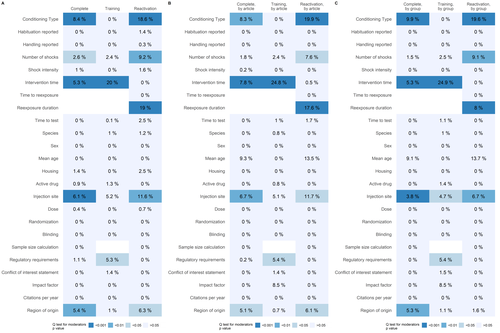
GAROFALO Sara
- Department of Psychology, University of Bologna, Cesena, Italy
- Behavioral/Cognitive Neuroscience, Electrophysiology, Humans, Methods development
- recommender
Recommendation: 1
Reviews: 0
Recommendation: 1

A meta-analysis of the effect of protein synthesis inhibitors on rodent fear conditioning
Bridging consensus and controversy in fear conditioning research via meta-analysis
Recommended by Sara Garofalo based on reviews by Emiliano Merlo and 1 anonymous reviewerThe study conducted by Carneiro and colleagues (Carneiro et al., 2023) seeks to explore the specific circumstances that influence the impact of protein synthesis inhibitors on the formation and endurance of fear-related memories. This investigation takes the form of a comprehensive meta-analysis of existing literature, making two significant contributions. Firstly, it enhances our understanding of fear conditioning by corroborating established interpretations (Schroyens et al., 2019, 2021) while also introducing novel insights. Secondly, it contributes to the ongoing discourse within behavioral neuroscience regarding the practicality and challenges of applying systematic reviews and meta-analyses to pre-clinical research (Prinz et al., 2011; Errington et al., 2021).
To delve deeper into the subject, the authors conducted distinct meta-analyses for different injection sites and target sessions, thus examining the intervention's effects under varying conditions. Their findings highlight the robust influence of protein synthesis inhibitors on memory consolidation and reconsolidation, but suggest a lack of significant impact on extinction, potentially attributed to the limited number of studies on this topic. Notably, their analysis pinpoints certain well-recognized influencing factors, such as intervention timing and re-exposure duration. However, other proposed boundary conditions, such as memory age and training strength, do not appear to significantly influence the effect size, possibly due to a limited number of studies. This leads to the conclusion that while meta-analyses are valuable for consolidating existing knowledge, substantiation through well-powered, confirmatory experiments is imperative.
Moreover, the research underlines the substantial heterogeneity among individual experiments, particularly within studies, which poses challenges for meta-analysis. Aggregating studies using various methodologies increases the capacity to identify influencing factors, emphasizing the importance of these approaches. The study also addresses the limitations of existing meta-analysis methods and suggests that additional sources of variability and difficulties in replication may exist, extending beyond the usual boundary conditions. These challenges could be attributed to biases within the literature, random error, or variations in experimental protocols.
The paper highlights the significance of rigorous and reproducible research practices in pre-clinical investigations, emphasizing the need for an iterative process that combines data synthesis with empirical testing. While meta-analyses serve as valuable tools for knowledge consolidation, the authors stress that they cannot replace high-powered, confirmatory replication studies. Consequently, they advocate for a more holistic and interconnected approach to experimental science, incorporating data synthesis with empirical validation to enhance the reliability of research findings.
References
Carneiro CFD, Amorim FE, Amaral OB (2023) A meta-analysis of the effect of protein synthesis inhibitors on rodent fear conditioning. , 2022.10.11.509645. https://doi.org/10.1101/2022.10.11.509645
Errington TM, Mathur M, Soderberg CK, Denis A, Perfito N, Iorns E, Nosek BA (2021) Investigating the replicability of preclinical cancer biology. eLife, 10, e71601. https://doi.org/10.7554/eLife.71601
Prinz F, Schlange T, Asadullah K (2011) Believe it or not: how much can we rely on published data on potential drug targets? Nature Reviews. Drug Discovery, 10, 712. https://doi.org/10.1038/nrd3439-c1
Schroyens N, Alfei JM, Schnell AE, Luyten L, Beckers T (2019) Limited replicability of drug-induced amnesia after contextual fear memory retrieval in rats. Neurobiology of Learning and Memory, 166, 107105. https://doi.org/10.1016/j.nlm.2019.107105
Schroyens N, Sigwald EL, Van Den Noortgate W, Beckers T, Luyten L (2021) Reactivation-Dependent Amnesia for Contextual Fear Memories: Evidence for Publication Bias. eNeuro, 8, ENEURO.0108-20.2020. https://doi.org/10.1523/ENEURO.0108-20.2020